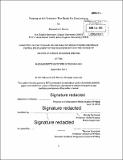Preying on the predator : the shark fin controversy
Author(s)
Morris, Alexandra H
DownloadFull printable version (1.490Mb)
Alternative title
Shark fin controversy
Other Contributors
Massachusetts Institute of Technology. Graduate Program in Science Writing.
Advisor
Marcia Bartusiak.
Terms of use
Metadata
Show full item recordAbstract
The consumption of shark fin soup dates back to the Ming Dynasty in China, when it was served to emperors. Today, the cultural delicacy represents wealth, status, and power. Over the past 30 years, with the rising middle class in China, the demand for shark fins has surged. To address the increasing demand, a group of fishermen came to realize there was little value in carting massive shark bodies to shore when all they needed were the highly valued fins. So they sliced off the fins, and threw the still living, rudderless sharks to die in the open ocean. So began the gruesome practice known as "shark finning." Shark populations have been unable to withstand the demand for their fins, and dozens of species are now threatened or endangered. From enhancing legislation to control the shark fin market to building sustainable fisheries to promoting synthetic shark fin soup - efforts to address the issue of shark depletion are seemingly endless. And yet despite these efforts, both the market for shark fins and global catch rates have continued unabated. If the demand for fins and the practice of shark finning continue at the current rate, human interference may forever change the nature of our oceans.
Description
Thesis: S.M. in Science Writing, Massachusetts Institute of Technology, Department of Humanities, Graduate Program in Science Writing, 2014. Cataloged from PDF version of thesis. Includes bibliographical references (pages 23-25).
Date issued
2014Department
Massachusetts Institute of Technology. Graduate Program in Science Writing; MIT Program in Writing & Humanistic StudiesPublisher
Massachusetts Institute of Technology
Keywords
Graduate Program in Science Writing.